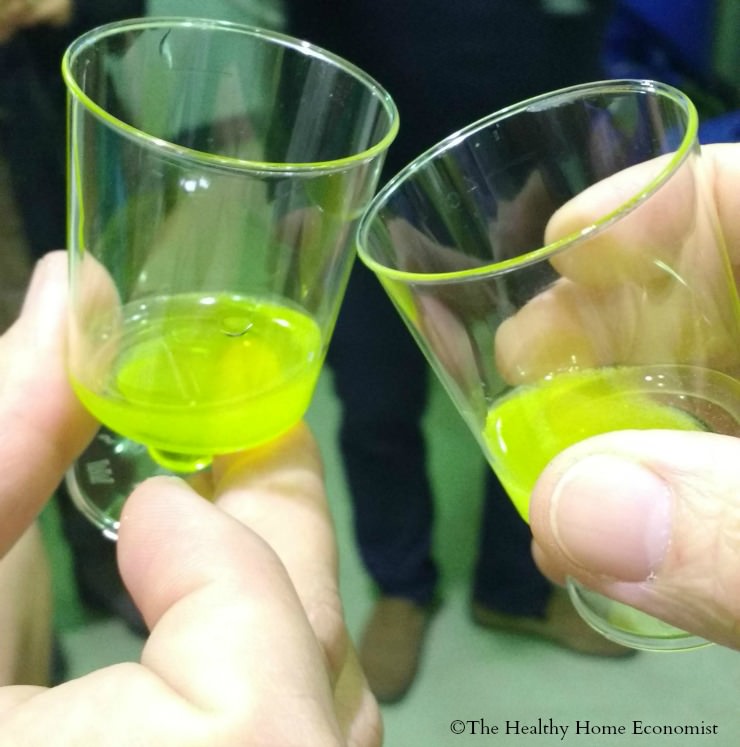
Have you ever wondered what the food factories of the future will look like?
It seems clear at least to me that the food processing methods of today are not only unsustainable for the planet but also unsustainable for the consumer from a health point of view.
The culinary wisdom of the past has been all but lost in dispassionate, soulless and frenetic mechanization with speed, convenience, and maximization of profits the primary objectives.
The result?
An enormous and dazzling array of brightly colored boxes and packages in modern supermarkets that beckon shoppers to fill their shopping carts and walk-in pantries with nutritionless, addictive, and fractionated foods that slowly but surely steal away health and vitality.
It doesn’t have to be this way!
Modern technology can be harnessed as the servant of the time-honored methods of food cultivation and preparation so that processing is highly efficient and profitable while retaining the nutrient value, appeal, and digestibility of traditional provisions.
The exciting news is that the factory of the future exists today. The efforts of visionary entrepreneurs such as Carla Bartolucci, author of the highly acclaimed Einkorn: The Cookbook, are spawning a food processing renaissance which brings small, biodynamic farms and state of the art factories together to produce nutrient-dense, delicious and highly digestible products which truly nourish and delight consumers while respecting and preserving the natural environment.
I had the privilege of touring one such factory while on a culinary tour of Italy. The factory carefully and passionately produces an exclusive Olio Nuovo extra virgin olive oil.
It is derived from three ancient varieties of olives grown in the Veneto region of Italy: Favarol, Grignano, and Nostrano. The Romans planted the original olive trees that produce these varieties near present-day Verona 1,000 years ago.
While modern-day olive oil processing involves ripping out ancient olive trees to replant younger, more closely spaced trees that favors a more profitable, mechanized harvest, a small group of passionate farmers is working tirelessly to save these unique varieties from extinction.
The result is Jovial Foods’ exclusively grown Italian olive oil that you can trust to be completely pure, authentic and delicious and exactly the same as the Romans enjoyed centuries ago!
During my tour of Jovial’s olive oil processing facility, I was able to personally verify the authenticity of this amazing product. The pictures and video vignettes below will hopefully give you a flavor for how the factory of the future will operate with technology that enhances rather than squashes traditional food wisdom.
Traditional Extra Virgin Olive Oil from Tree to Bottle
This first photo below is of an organic olive tree hundreds of years old. Jovial Food’s extra virgin olive oil uses three ancient varieties of trees like this that have been preserved to save them from extinction. Contrary to popular belief, there is no reason to replace these ancient varieties with newly planted ones because older trees produce just as abundantly.
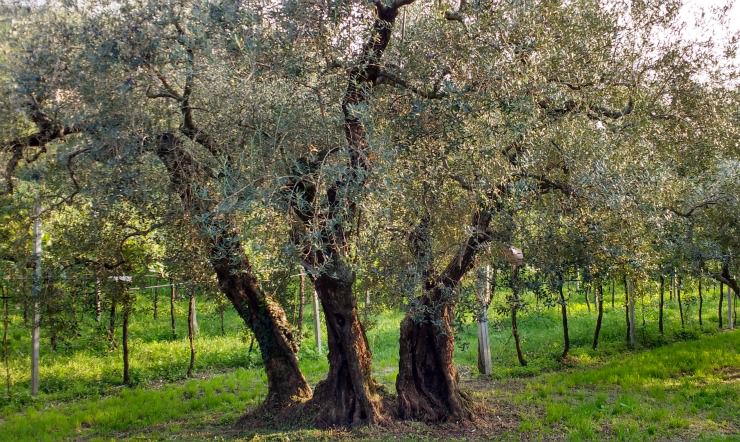
The video snippet below shows how the olives from these ancient trees are carefully harvested with an air powered “comb” which shakes the olives loose from the branches with no damage to the trees. The olives fall onto a netting on the ground beneath the tree where they are easily collected.
Harvesting
Testing the Olives
The next step in transforming olives to 100% authentic, Italian extra virgin olive oil is to deliver the olives to the processing facility. The factory where the Jovial Foods olive oil is produced is very, very special in that it respects and preserves all the traditional methods for olive oil production within a state of the art facility.
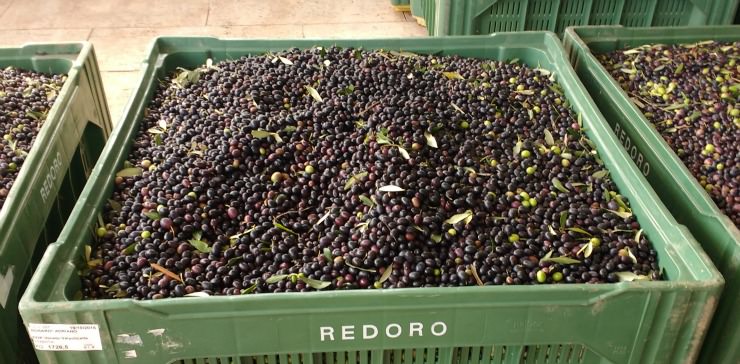
A very important step at this point is to assess the olives in the bins to estimate how many might be crushed or damaged in some way. Note that the name of the farm which delivered the olives is listed on each bin (see the white tag in the photo above) to ensure that the right olives are being used for every batch made.
It is very difficult for a machine to determine the quality of the olives in each bin as this is a subjective task, so human hands are best used here! Running your hands through the bins and quickly assessing the percentage of damaged olives in each handful is all that it takes. Processing damaged olives can negatively impact the flavor of the final product. As you can see, the olives from this batch are in excellent condition. Bins that contain too many damaged olives are rejected.
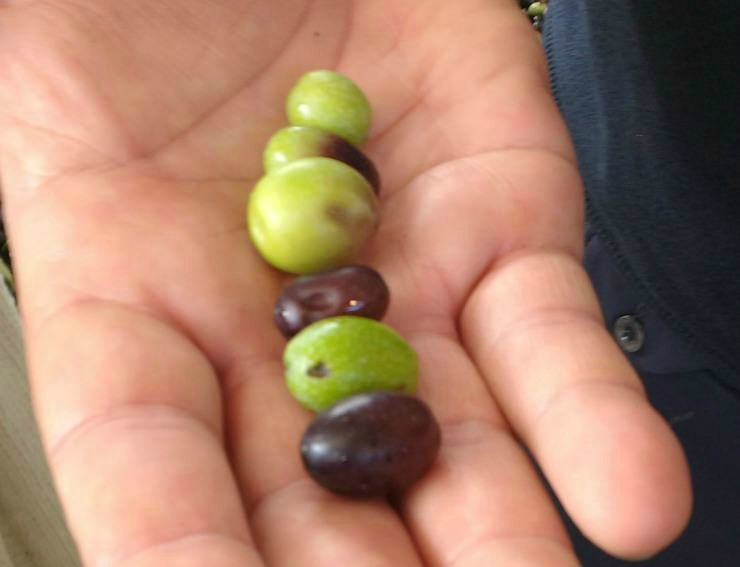
Remove Leaves and Twigs
The next step as you can see in the video snippet below is to and remove the leaves. This is very important as leaves crushed along with the olives will negatively impact the taste of the extra virgin olive oil. Some conventional olive oil companies prefer to process the leaves along with the olives which artificially boosts the green color of the oil which the consumer perceives as positive. However, this is not a traditional approach as it adversely affects the taste and quality of the final product.
Washing
After the leaves are removed, the olives are washed in a solution of pure mountain spring water which removes any debris that might adversely affect the taste of the extra virgin olive oil.
Crushing
Once the olives have been cleaned and the leaves removed, the olives are crushed to begin the process of extracting the oil.
Separate Oil from Water
Once crushed, the olive mash is gently churned to separate the oil from the water.
The crushing and churning of the olives take place at temperatures well below 80°F/27°C. As you can see from the prominently displayed temperature gauge (shown in Celsius), Jovial Foods’ ancient blend of extra virgin olive oil remains well below that level. Keeping the temperature low is critical as this preserves the enzymes, valuable polyphenols and delicate co-factors present in the oil.
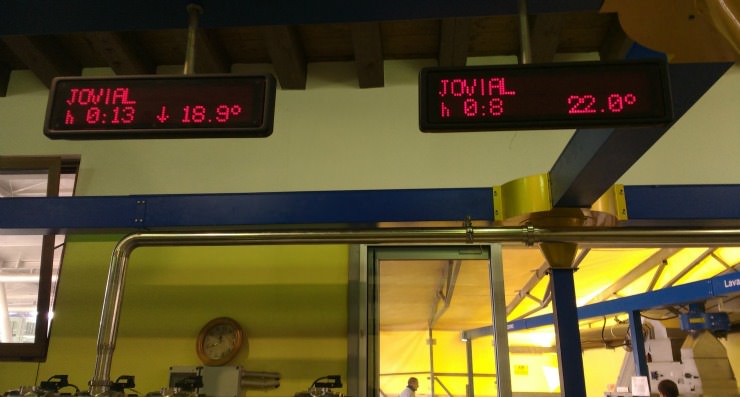
Bottling
Once separated from the water, the extra virgin olive oil comes flowing out and is stored in stainless steel tanks on the floor below to be bottled. This is important as the pressing and bottling should ideally take place within the same facility. In addition, the facility should process olive oil alone. Jovial Foods extra virgin olive oil is not filtered as decanting naturally removes any sediment.
Once the first batch of olive oil begins to flow, it is traditional to do a toast to celebrate the year’s first tasting. This season has been a great harvest, so it is very exciting! Toasting from left to right: Kevin McGruther (Nourished Kitchen), Rodolfo Viola (Jovial Foods), Lorenzo Salvagno (Redoro Production Manager), Carla Bartolucci (Jovial Foods), Daniele Salvagno (Redoro Marketing and Sales), Jenny McGruther (Nourished Kitchen), and me!
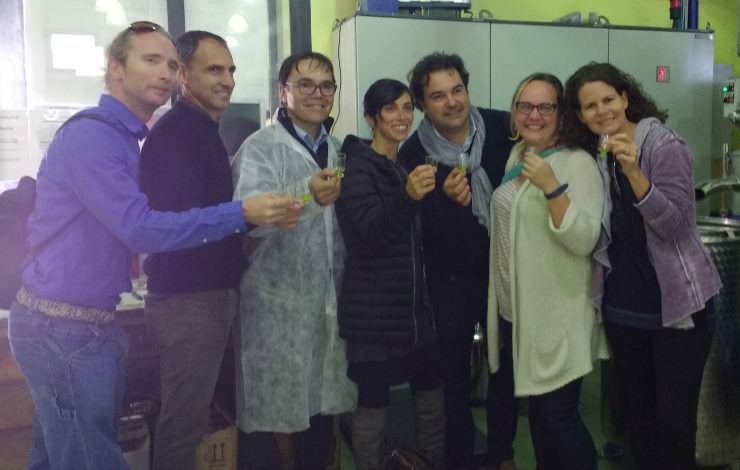
Try Extra Virgin Olive Oil Made from Ancient Olive Varieties for Yourself!
When traditional processing methods are respected and preserved, it is indeed possible for the factory of the future to efficiently produce food that has all the nutrients and benefits to health retained. The facility described above carefully selected by Jovial Foods produces extra virgin olive oil that is not only delicious, but also nutritious, high in enzymes, low acidity (<.4%), and naturally rich in beneficial polyphenols. Best of all, the oil comes from ancient varieties of olives that need to be preserved from extinction and its farmers supported to ensure that these trees are gifted to the next generation.








Hi Sarah. I live in the U.K. and buy my olive oil either directly from the farmer through crowd funding or through a small organic Greek retailer in London. All their extra virgin olive oil is sold in cans. My question is is this ok? Or should I avoid oil in cans?
Hi Sarah,
How does this compare with the Olea Estates Olive Oil?
(What a terrible loss in mass production of inferior products and the tearing down of these ancient landmarks!)
Thank you for the introduction of Jovial Foods to me 🙂 Beautiful pictures, videos, and history…
I honestly like the taste of Jovial better. Also, I’ve never toured the Olea Production facilities, so while they are probably fine, I feel more comfortable with using and recommending what I have witnessed firsthand tree to bottle.
love this post, Sarah…. The process shown here is time-honored and typical of the region where
I still have family in Italy… So happy there is an effort to preserve these very fine, very old,
magnificent trees. ” Liquid Gold” ~ a gift from God.
I agree … cutting down these trees is a travesty! When you walk through an olive grove of these ancient trees that are centuries old – it is such an amazing feeling. Hard to describe. I am honored to be able to support the farmers that are working to preserve them by using this incredible and ancient olive oil!
Just curious as to why you don’t use dark glass to block out the harmful light rays. I’ve read many times that this is very beneficial in preserving this type of product.
The Jovial Foods olive oil is definitely bottled in dark glass!
I use extra virgin olive oil to make my salad dressing and add apple cider vinegar and salt, pepper and a clove of garlic. However, my elderly Mom is taking a drug for hypothyroidism and it specifies not to use vinegar. I read in Nourishing Traditions where some people use beet kvass instead of vinegar in their salad dressings. Do you know a source where I can find this product already made. I can’t find any organic beets to make it with and I’m not physically able to garden.
The price on this olive oil is very good compared to the watered down olive oils in the stores.
Yes, Zukay makes a very good beet kvass that is available in many Whole Foods: https://amzn.to/1P1G2Ad
Thanks Sarah.
I grew up in Traditional Italian family. Olive oil and fresh squeezed lemon on a salad
is typical and delicious. I still do this. I also carry a small bottle of EVOO and a fresh
lemon in my purse if dining out.
I’ve been buying this olive oil since Jovial first began offering it on their website. It is absolutely WONDERFUL. I haven’t bought any other olive oil since.
I’ve tasted this extra virgin olive oil and it was like you write on: “never tasted before” – The microclimatic variety of Verona’s hills and Lago di Garda give to this olive oil a special flavours. It will be a component of my food since today.
Sarah do you know how long an opened bottle will last without going rancid, how fast should a bottle be used up?
Jovial’s extra virgin olive oil is best consumed when the health giving polyphenols are at their peak so purchasing this new season’s batch and using within 12 months is optimal. Unlike wine, olive oils do not get better with age, so the closer to the release date that you purchase and use it, the better. However, the higher levels of natural antioxidants and the higher proportion of stable monounsaturated fats found in extra virgin olive oil means that it will remain fresher longer than other edible oils, so you can expect it to retain excellent freshness and flavor stored in the pantry for even longer than a year.
is the olive pressing “cold pressed”?
Yes, please see the picture above which shows the temperature at which the olives are being pressed … it remains under the desired temperature at all times. I watched the process from start to finish.
It looks heavenly! I’m going to get some. Do you think it’s okay to sauté with this oil, or is it too delicate?
A low temperature saute is totally fine for extra virgin olive oil! Try not to get the temperature too high though (keep under 250-300F if possible). It will damage the phenols which are so beneficial. It won’t turn the oil rancid or anything though contrary to what some sites say. Cooking with olive oil is fine .. you just lose the enzymes and phenols.
This is so helpful, thanks! That picture of the fresh olive oil in the shot glass looks heavenly. It actually caused me to start salivating.